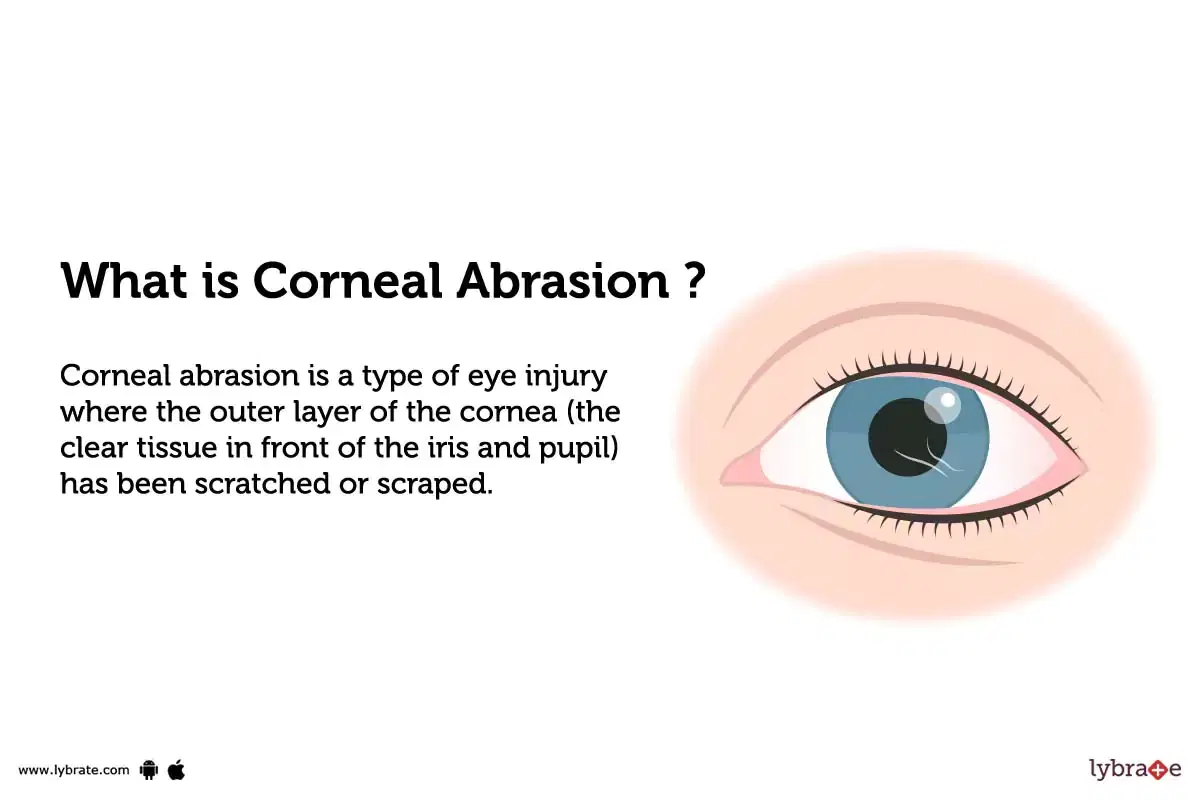Corneal Abrasion: Causes, Symptoms, Treatment and Cost
Last Updated: Feb 18, 2023
What is Corneal Abrasion ?
Corneal abrasion is a type of eye injury where the outer layer of the cornea (the clear tissue in front of the iris and pupil) has been scratched or scraped.
Types of Corneal Abrasion
There are several types of corneal abrasions that can occur:
- Superficial Abrasion :This type of abrasion involves only the outer layer of the cornea or the epithelium. It is typically treated with antibiotics and lubricating eye drops and usually heals within a few days without further complications.
- Stromal Abrasion :This type of abrasion is more serious since it affects both the epithelium layer and a deeper layer of tissue in the cornea known as stroma.
- Penetrating Abrasions :This is the most serious type of corneal trauma since it involves an object puncturing through all layers of the cornea including both epithelium and stroma layers.
What causes Corneal Abrasion ?
Corneal abrasions can be caused by a variety of sources, including physical trauma (e.g. scratched by a fingernail or other rough object), chemical exposure (e.g. certain soaps and swimming pool water), foreign bodies embedded in the eye, improperly fitted contact lenses, and unknown causes.
Additionally, poor eye hygiene might increase the likelihood of acquiring a corneal abrasion.
What are the symptoms of Corneal Abrasion ?
- Pain: Patients typically experience pain, which can range from mild to severe.
- Redness: The affected eye often appears red and swollen.
- Blurry Vision: Blurred or impaired vision is usually present due to the damage on the cornea.
- Tearing/Discharge: Tearing and discharge of thin, watery fluid (tears) may occur due to the irritation caused by the abrasion on the eye's surface.
- Light Sensitivity: Light sensitivity is a common symptom, as blinking and eye rubs can further irritate the injury, causing more pain and discomfort when exposed to light or bright environments.
How can you prevent Corneal Abrasion ?
- When playing sports or working with power tools, it's crucial to use eyewear with side shields.
- Use safety goggles when working in hazardous conditions, such as chemical laboratories.
- Avoid rubbing or touching the eyes, especially with unclean hands or fingers.
- Maintain good eye hygiene and regular eye doctor visits.
- Wear contact lenses as directed by an optometrist or ophthalmologist; never share contact lenses with others and always clean and disinfect them properly before use (e.g., with sterile saline solution).
Corneal Abrasion - Diagnosis and Tests
- Slit-Lamp Examination: This is a common test used to diagnose corneal abrasions. It involves shining a light through the cornea to check for any signs of injury, such as scratches and tears.
- Fluorescein Eye Drops: These drops are used to dye the area of the eye affected by the corneal abrasion. This aids in the detection of eye injuries like scratches and cuts by medical professionals.
- Corneal Topography: This test uses a special camera that takes pictures of the front surface of the eye and evaluates its shape and curvature. It can detect any abnormalities that may be caused by a corneal abrasion.
- Corneal Ultrasound: This test uses sound waves to create an image of the eye and check for any irregularities in its structure, such as abrasions or tears in the cornea.
- Schirmer Test: This test measures the amount of tears produced by an individual and is used to determine if there is any damage to the tear ducts or other structures due to a corneal abrasion.
What are possible complications of Corneal Abrasion?
Corneal abrasions may lead to a number of complications including:
- Ulceration: Open wound on the cornea, resulting in pain and vision loss.
- Inflammation: Inflammatory reaction leading to redness and swelling of the eye.
- Infection: Bacterial or viral infection which can cause swelling and vision problems.
- Damage to other structures: Damage to the eyelids, eyelashes, or other structures around the eye can occur due to rubbing or scratching due to irritation caused by abrasion.
- Permanent scarring/transparency loss: Long-term vision problems such as reduced transparency of the cornea leading to blurred vision can occur from deep abrasion that does not heal correctly, or from continuous rubbing caused by a foreign body in the eye for extended periods of time without being removed
Home Remedies for Corneal Abrasion
- Place a few drops of pure ghee (clarified butter) in the affected eye several times a day to moisten and lubricate the cornea.
- Dip a clean cotton swab in rose water and dab it gently on the affected area to reduce inflammation and promote healing.
- Make an eyewash by boiling 1 teaspoon of fenugreek seeds in 1 cup of water for 15 minutes, strain it, and let it cool down before using it as an eyewash two to three times a day.
- Prepare a paste of 1 teaspoon each of turmeric powder, coriander powder and unrefined sesame oil and apply it around the eyes at night before going to bed.
- Soak 2 teaspoons of fennel seeds in 1 cup of water overnight and use the strained liquid as an eyewash two or three times daily for a few days to reduce pain and irritation caused by corneal abrasion.
What to eat in Corneal Abrasion?
- Eat a diet rich in Vitamin A, such as eggs, dark leafy greens, oranges, and fortified cereals.
- Take supplements of Vitamin A or beta-carotene to help speed healing of the abrasion.
- Drink plenty of fluids to help keep the eyes lubricated and reduce pain from dryness.
- Use artificial tears or other lubricating eye drops to help keep the eye moist and reduce discomfort from dryness.
What not to eat in Corneal Abrasion?
- Do not eat anything that could cause further irritation to the abraded cornea, such as spicy, acidic, or crunchy foods.
- Avoid eating any sharp or abrasive foods that could scratch the abraded cornea, such as chips or popcorn.
- Avoid contact with allergens that could cause additional inflammation, such as peanuts and shellfish.
- Refrain from consuming alcohol or caffeinated beverages which can increase discomfort and delay healing time.
Corneal Abrasion Treatment
- Artificial Tears: Artificial tears help keep the eye lubricated and prevent it from becoming dry and irritated while it heals.
- Patching: In some cases, it may be necessary to patch the eye to keep it safe while it heals. This will help prevent any further damage to the cornea as well as reduce pain levels.
- Corneal Abrasion Repair: This surgery is used to repair the surface of the cornea when it has been scratched or abraded. The surgery involves removing the damaged tissue and replacing it with healthy tissue.
- Corneal Transplant: This surgery replaces the cornea with a donor cornea from a deceased individual. The surgical procedure involves removing the damaged cornea and replacing it with a healthy donor cornea.
- Keratoplasty: This is a more complex form of corneal transplant, which removes part or all of the damaged cornea and replaces it with a healthy donor cornea. It can be performed for patients who have severe scarring due to a corneal abrasion or other injury.
- Corneal Grafting: This is a type of reconstructive surgery that uses a graft from another area of the patient’s body to replace part or all of the damaged cornea. It is used when there is extensive damage to the eye that cannot be repaired with other methods.
- Phototherapeutic Keratectomy (PTK): During this procedure, an ultraviolet light beam is used to remove thin layers of cells from the surface of the eye in order to reduce scars and smooth out irregularities caused by an abrasion or other injury.
Which doctor to consult for Corneal Abrasion?
The best type of doctor to consult for a corneal abrasion is an ophthalmologist, who specializes in eye health and vision care.
Which are the best medicines for Corneal Abrasion?
- Antibiotic ointment or drops: Antibiotic ointment or drops can help prevent infection and promote healing.
- Tetracaine: Tetracaine is a topical anesthetic that can be used to relieve pain associated with a corneal abrasion.
- Cycloplegic eye drops: Cycloplegic eye drops are used to relax the muscles in the eye, which helps to reduce pain and discomfort associated with a corneal abrasion.
- Corticosteroid drops: Corticosteroid drops may be prescribed to reduce inflammation and pain associated with a corneal abrasion.
- Cycloplegic medications: These are eye drops that relax the muscles in the eyes, reducing discomfort and helping the cornea heal more quickly.
How long does it take to recover from Corneal Abrasion?
It can take anywhere from 3-7 days to recover from a corneal abrasion. However, the recovery time can vary depending on the severity of the abrasion and how well you follow your doctor's instructions.
Are the results of the treatment of corneal abrasion permanent?
No, the results of treatment for corneal abrasion are not permanent.
What are post-treatment guidelines?
- Follow-up visits to the doctor should be scheduled for re-evaluation and monitoring of the eye to ensure adequate healing.
- During recovery, your doctor may recommend that you wear an eye patch overnight or during the day to protect the affected eye and reduce friction and infection risk while sleeping or during activities.
- Artificial tears, lubricants, and ointments may be prescribed to help keep the abraded area moist as it heals which can offer relief from pain and irritation caused by dryness or air exposure.
- Pain medications may be recommended by your doctor in order to reduce discomfort associated with corneal abrasions.
- If a foreign object was left behind, a procedure called ‘foreign body removal’ may need to be done in order to remove it from the eye and allow full healing of the cornea
What is the cost of Corneal Abrasion treatments in India?
Generally, treatment costs may range from ₹500-6000 for consultation and follow up visits with an ophthalmologist, additional charges if medications are prescribed, and any special diagnostic tests such treatments might require.
What are side-effects of Corneal Abrasion treatments?
- The most common side effects of corneal abrasion treatments are eye pain, light sensitivity, blurred vision, tearing and redness.
- Corneal abrasions can also lead to infection if not treated promptly.
- Other potential side effects include double vision, swelling of the eye andForeign body sensation.
Corneal Abrasion - Outlook/ Prognosis
If you are suffering from any complications relating to corneal Abrasionthen you should consult a doctor nearby as they can cause complications like 'bacterial keratitis, corneal ulcers, traumatic iritis, and recurrent erosion syndrome' in which treatment course can range from a few months to years depending on the severity of the situation.
Table of content
15+ Years of Surgical Experience
All Insurances Accepted
EMI Facility Available at 0% Rate
Find Ophthalmologist near me
Ask a free question
Get FREE multiple opinions from Doctors


